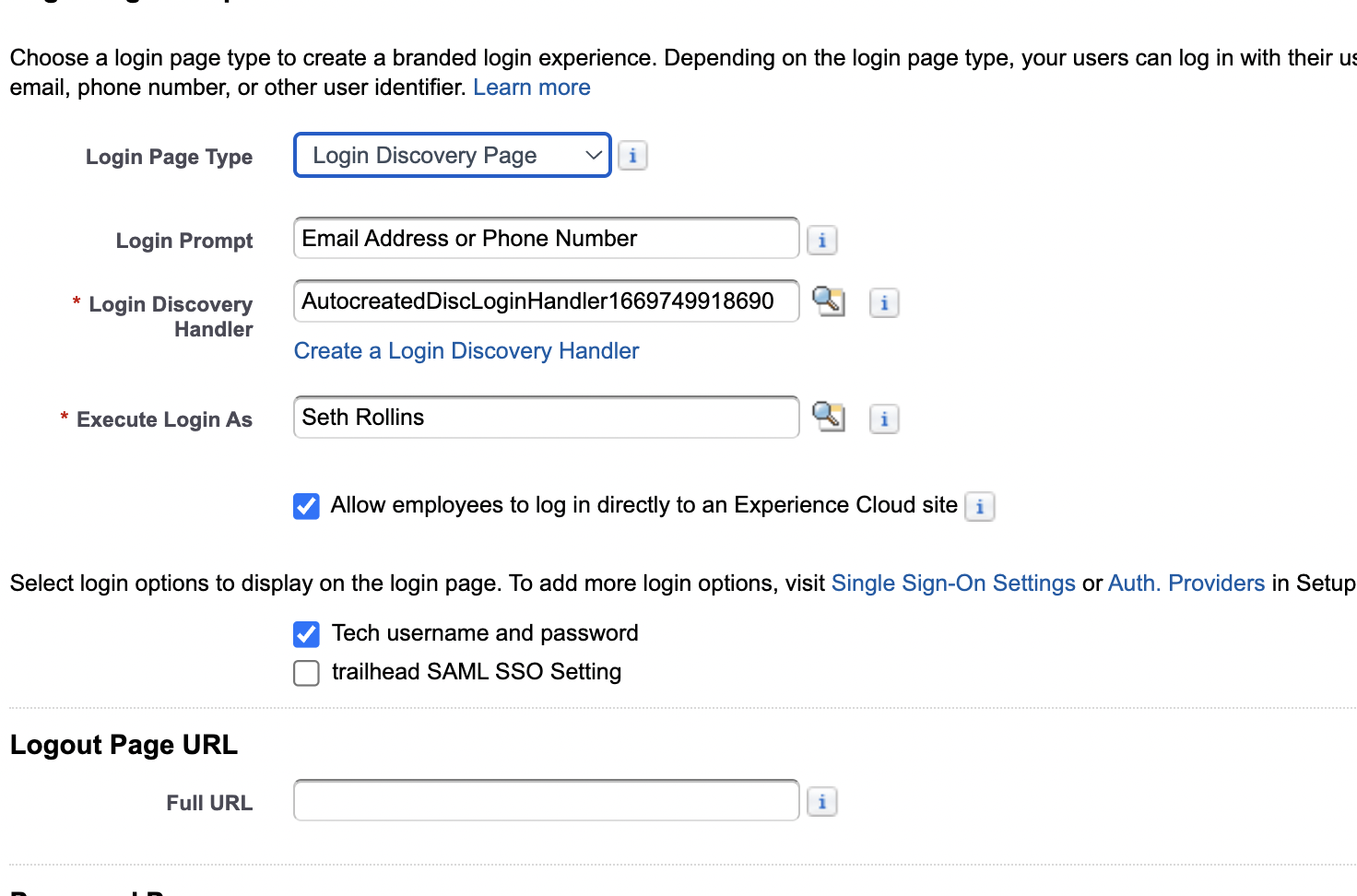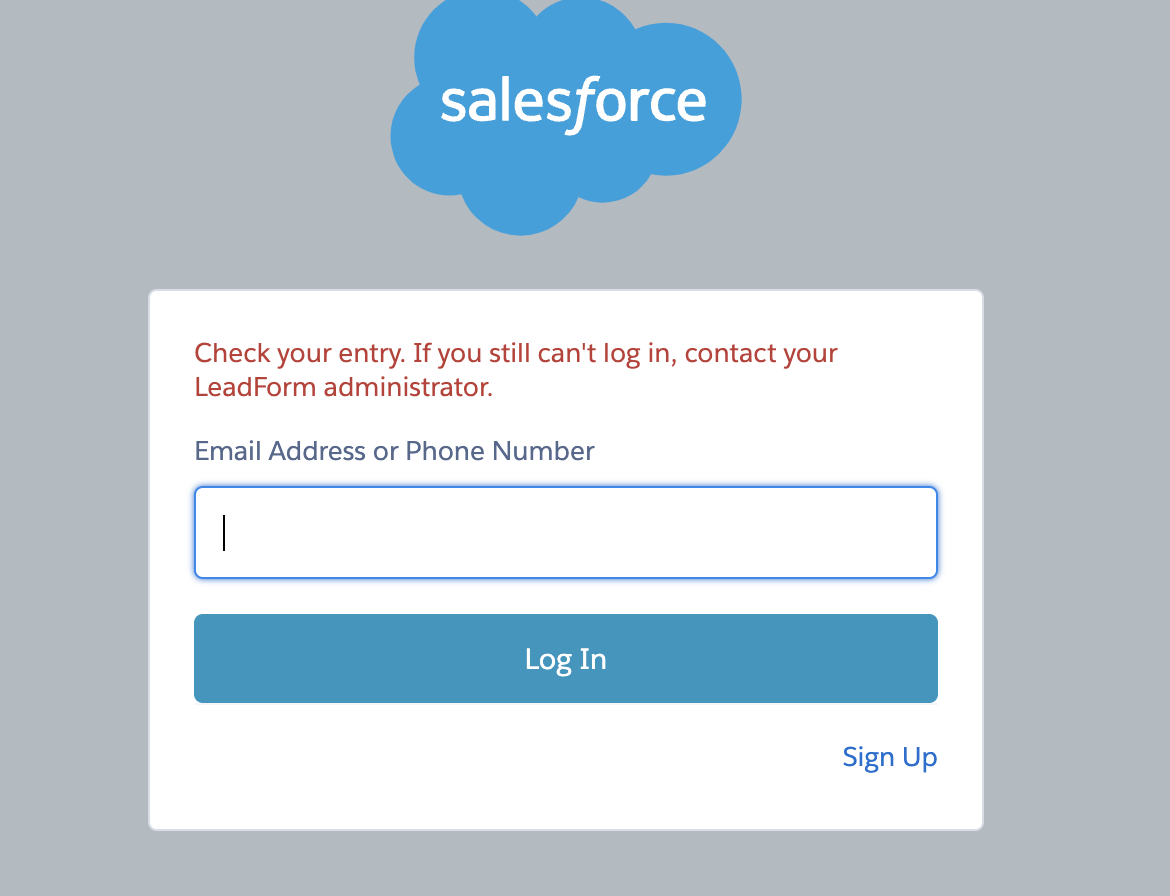You need to sign in to do that
Don't have an account?
How to modify Apex Class
I have one LWR site and Select Login Discovery Page as Login Type for my site.
 And I am getting this Error
And I am getting this Error
 Given Apex Class:
Given Apex Class:
// This auto-generated class contains the default logic for login discovery by SMS or email.
// You can customize the code to ensure it meets your needs. The requestAttributes parameter
// provides additional information you can use in the discovery logic. Attributes include CommunityUrl,
// IpAddress, UserAgent, and location information (such as Country and City).
global class AutocreatedDiscLoginHandler1669749918690 implements Auth.LoginDiscoveryHandler {
global PageReference login(String identifier, String startUrl, Map<String, String> requestAttributes) {
if (identifier != null && isValidEmail(identifier)) {
// Search for user by email
List<User> users = [SELECT Id FROM User WHERE Email = :identifier AND IsActive = TRUE];
if (!users.isEmpty() && users.size() == 1) {
// User must have verified email before using this verification method. We cannot send messages to unverified emails.
// You can check if the user has email verified bit on and add the password verification method as fallback.
List<TwoFactorMethodsInfo> verifiedInfo = [SELECT HasUserVerifiedEmailAddress FROM TwoFactorMethodsInfo WHERE UserId = :users[0].Id];
if (!verifiedInfo.isEmpty() && verifiedInfo[0].HasUserVerifiedEmailAddress == true) {
// Use email verification method if the user's email is verified.
return discoveryResult(users[0], Auth.VerificationMethod.EMAIL, startUrl, requestAttributes);
} else {
// Use password verification method as fallback if the user's email is unverified.
return discoveryResult(users[0], Auth.VerificationMethod.PASSWORD, startUrl, requestAttributes);
}
} else {
throw new Auth.LoginDiscoveryException('No unique user found. User count=' + users.size());
}
}
if (identifier != null) {
String formattedSms = getFormattedSms(identifier);
if (formattedSms != null) {
// Search for user by SMS
List<User> users = [SELECT Id FROM User WHERE MobilePhone = :formattedSms AND IsActive = TRUE];
if (!users.isEmpty() && users.size() == 1) {
// User must have verified SMS before using this verification method. We cannot send messages to unverified mobile numbers.
// You can check if the user has mobile verified bit on or add the password verification method as fallback.
List<TwoFactorMethodsInfo> verifiedInfo = [SELECT HasUserVerifiedMobileNumber FROM TwoFactorMethodsInfo WHERE UserId = :users[0].Id];
if (!verifiedInfo.isEmpty() && verifiedInfo[0].HasUserVerifiedMobileNumber == true) {
// Use SMS verification method if the user's mobile number is verified.
return discoveryResult(users[0], Auth.VerificationMethod.SMS, startUrl, requestAttributes);
} else {
// Use password verification method as fallback if the user's mobile number is unverified.
return discoveryResult(users[0], Auth.VerificationMethod.PASSWORD, startUrl, requestAttributes);
}
} else {
throw new Auth.LoginDiscoveryException('No unique user found. User count=' + users.size());
}
}
}
if (identifier != null) {
// You can customize the code to find user via other attributes, such as SSN or Federation ID
}
throw new Auth.LoginDiscoveryException('Invalid Identifier');
}
private boolean isValidEmail(String identifier) {
String emailRegex = '^[a-zA-Z0-9._|\\\\%#~`=?&/$^*!}{+-]+@[a-zA-Z0-9.-]+\\.[a-zA-Z]{2,4}$';
// source: http://www.regular-expressions.info/email.html
Pattern EmailPattern = Pattern.compile(emailRegex);
Matcher EmailMatcher = EmailPattern.matcher(identifier);
if (EmailMatcher.matches()) { return true; }
else { return false; }
}
private String getFormattedSms(String identifier) {
// Accept SMS input formats with 1 or 2 digits country code, 3 digits area code and 7 digits number
// You can customize the SMS regex to allow different formats
String smsRegex = '^(\\+?\\d{1,2}?[\\s-])?(\\(?\\d{3}\\)?[\\s-]?\\d{3}[\\s-]?\\d{4})$';
Pattern smsPattern = Pattern.compile(smsRegex);
Matcher smsMatcher = SmsPattern.matcher(identifier);
if (smsMatcher.matches()) {
try {
// Format user input into the verified SMS format '+xx xxxxxxxxxx' before DB lookup
// Append US country code +1 by default if no country code is provided
String countryCode = smsMatcher.group(1) == null ? '+1' : smsMatcher.group(1);
return System.UserManagement.formatPhoneNumber(countryCode, smsMatcher.group(2));
} catch(System.InvalidParameterValueException e) {
return null;
}
} else { return null; }
}
private PageReference getSsoRedirect(User user, String startUrl, Map<String, String> requestAttributes) {
// You can look up if the user should log in with SAML or an Auth Provider and return the URL to initialize SSO.
return null;
}
private PageReference discoveryResult(User user, Auth.VerificationMethod method, String startUrl, Map<String, String> requestAttributes) {
//Only external users with an External Identity or community license can login using Site.passwordlessLogin
//Use getSsoRedirect to enable internal user login for a community
PageReference ssoRedirect = getSsoRedirect(user, startUrl, requestAttributes);
if (ssoRedirect != null) {
return ssoRedirect;
} else {
if (method != null) {
List<Auth.VerificationMethod> methods = new List<Auth.VerificationMethod>();
methods.add(method);
PageReference pwdlessRedirect = Site.passwordlessLogin(user.Id, methods, startUrl);
if (pwdlessRedirect != null) {
return pwdlessRedirect;
} else {
throw new Auth.LoginDiscoveryException('No Passwordless Login redirect URL returned for verification method: ' + method);
}
} else {
throw new Auth.LoginDiscoveryException('No method found');
}
}
}
}
How Can I modify this Apex Class to AnyPerson(Both Internal and External) Can Enter any Email and we need verify mail is correct or not by just send Verification code Once verified They can access this LWR site.
// This auto-generated class contains the default logic for login discovery by SMS or email.
// You can customize the code to ensure it meets your needs. The requestAttributes parameter
// provides additional information you can use in the discovery logic. Attributes include CommunityUrl,
// IpAddress, UserAgent, and location information (such as Country and City).
global class AutocreatedDiscLoginHandler1669749918690 implements Auth.LoginDiscoveryHandler {
global PageReference login(String identifier, String startUrl, Map<String, String> requestAttributes) {
if (identifier != null && isValidEmail(identifier)) {
// Search for user by email
List<User> users = [SELECT Id FROM User WHERE Email = :identifier AND IsActive = TRUE];
if (!users.isEmpty() && users.size() == 1) {
// User must have verified email before using this verification method. We cannot send messages to unverified emails.
// You can check if the user has email verified bit on and add the password verification method as fallback.
List<TwoFactorMethodsInfo> verifiedInfo = [SELECT HasUserVerifiedEmailAddress FROM TwoFactorMethodsInfo WHERE UserId = :users[0].Id];
if (!verifiedInfo.isEmpty() && verifiedInfo[0].HasUserVerifiedEmailAddress == true) {
// Use email verification method if the user's email is verified.
return discoveryResult(users[0], Auth.VerificationMethod.EMAIL, startUrl, requestAttributes);
} else {
// Use password verification method as fallback if the user's email is unverified.
return discoveryResult(users[0], Auth.VerificationMethod.PASSWORD, startUrl, requestAttributes);
}
} else {
throw new Auth.LoginDiscoveryException('No unique user found. User count=' + users.size());
}
}
if (identifier != null) {
String formattedSms = getFormattedSms(identifier);
if (formattedSms != null) {
// Search for user by SMS
List<User> users = [SELECT Id FROM User WHERE MobilePhone = :formattedSms AND IsActive = TRUE];
if (!users.isEmpty() && users.size() == 1) {
// User must have verified SMS before using this verification method. We cannot send messages to unverified mobile numbers.
// You can check if the user has mobile verified bit on or add the password verification method as fallback.
List<TwoFactorMethodsInfo> verifiedInfo = [SELECT HasUserVerifiedMobileNumber FROM TwoFactorMethodsInfo WHERE UserId = :users[0].Id];
if (!verifiedInfo.isEmpty() && verifiedInfo[0].HasUserVerifiedMobileNumber == true) {
// Use SMS verification method if the user's mobile number is verified.
return discoveryResult(users[0], Auth.VerificationMethod.SMS, startUrl, requestAttributes);
} else {
// Use password verification method as fallback if the user's mobile number is unverified.
return discoveryResult(users[0], Auth.VerificationMethod.PASSWORD, startUrl, requestAttributes);
}
} else {
throw new Auth.LoginDiscoveryException('No unique user found. User count=' + users.size());
}
}
}
if (identifier != null) {
// You can customize the code to find user via other attributes, such as SSN or Federation ID
}
throw new Auth.LoginDiscoveryException('Invalid Identifier');
}
private boolean isValidEmail(String identifier) {
String emailRegex = '^[a-zA-Z0-9._|\\\\%#~`=?&/$^*!}{+-]+@[a-zA-Z0-9.-]+\\.[a-zA-Z]{2,4}$';
// source: http://www.regular-expressions.info/email.html
Pattern EmailPattern = Pattern.compile(emailRegex);
Matcher EmailMatcher = EmailPattern.matcher(identifier);
if (EmailMatcher.matches()) { return true; }
else { return false; }
}
private String getFormattedSms(String identifier) {
// Accept SMS input formats with 1 or 2 digits country code, 3 digits area code and 7 digits number
// You can customize the SMS regex to allow different formats
String smsRegex = '^(\\+?\\d{1,2}?[\\s-])?(\\(?\\d{3}\\)?[\\s-]?\\d{3}[\\s-]?\\d{4})$';
Pattern smsPattern = Pattern.compile(smsRegex);
Matcher smsMatcher = SmsPattern.matcher(identifier);
if (smsMatcher.matches()) {
try {
// Format user input into the verified SMS format '+xx xxxxxxxxxx' before DB lookup
// Append US country code +1 by default if no country code is provided
String countryCode = smsMatcher.group(1) == null ? '+1' : smsMatcher.group(1);
return System.UserManagement.formatPhoneNumber(countryCode, smsMatcher.group(2));
} catch(System.InvalidParameterValueException e) {
return null;
}
} else { return null; }
}
private PageReference getSsoRedirect(User user, String startUrl, Map<String, String> requestAttributes) {
// You can look up if the user should log in with SAML or an Auth Provider and return the URL to initialize SSO.
return null;
}
private PageReference discoveryResult(User user, Auth.VerificationMethod method, String startUrl, Map<String, String> requestAttributes) {
//Only external users with an External Identity or community license can login using Site.passwordlessLogin
//Use getSsoRedirect to enable internal user login for a community
PageReference ssoRedirect = getSsoRedirect(user, startUrl, requestAttributes);
if (ssoRedirect != null) {
return ssoRedirect;
} else {
if (method != null) {
List<Auth.VerificationMethod> methods = new List<Auth.VerificationMethod>();
methods.add(method);
PageReference pwdlessRedirect = Site.passwordlessLogin(user.Id, methods, startUrl);
if (pwdlessRedirect != null) {
return pwdlessRedirect;
} else {
throw new Auth.LoginDiscoveryException('No Passwordless Login redirect URL returned for verification method: ' + method);
}
} else {
throw new Auth.LoginDiscoveryException('No method found');
}
}
}
}
How Can I modify this Apex Class to AnyPerson(Both Internal and External) Can Enter any Email and we need verify mail is correct or not by just send Verification code Once verified They can access this LWR site.






 Apex Code Development
Apex Code Development